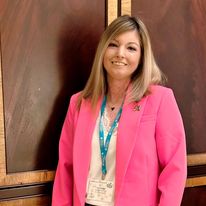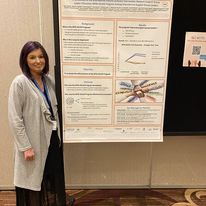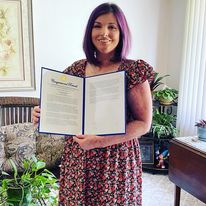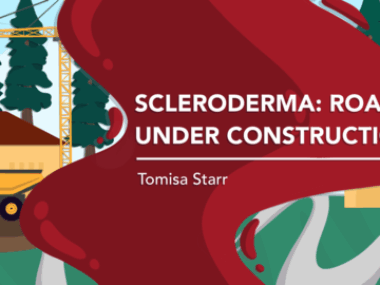How advocacy work helps me embrace living with scleroderma
Sharing my story enables me to educate and empower others
Written by |

Living with scleroderma has resulted in many new experiences, opportunities, and challenges for me. Since my diagnosis in 2001, I’ve spent much of my time educating others about how to manage symptoms, decrease stress, process mental health issues, navigate treatment options, and improve quality of life. This month, I was able to share my insight at a leadership conference hosted by the National Scleroderma Foundation, in New Orleans.

Amy poses for a snapshot at this month’s National Scleroderma Foundation leadership conference in New Orleans. (Courtesy of Amy Gietzen)
During the three-day event, I reflected on how involved I’ve become with the scleroderma community. The more I share my thoughts and feelings, the more opportunities I have to travel across the country and connect with patients, caregivers, clinicians, and medical professionals.
Traveling empowers me — not only as a patient, but as an informal educator. I love teaching other patients about how to change the trajectory of their life while navigating medical boundaries.
I’ve now lived with this debilitating, incurable illness for 22 years. For more than two decades, I’ve woken up every day in a body I can’t control. It took me a lot of time, patience, and determination to learn how to overcome the physical, mental, social, and professional adversities I’ve faced.
Reflecting on 2 decades of growth
During the first year after my diagnosis, I learned how to manage unwelcome stressors, such as side effects of new medications. I had to come to terms with the complete dissolution of my educational and professional career.
As time passed, I hit more speed bumps, including the loss of my independence, the financial burden of a chronic illness, and the end of many relationships. I began to lose faith in myself, my spirituality, and my loved ones. I felt isolated, with nowhere to turn for support and encouragement.

Amy showcases her abstract poster at a scleroderma conference in Niagara Falls, Ontario, Canada. (Courtesy of Amy Gietzen)
On top of all of my problems, I was still trying to find my place in the world as a young adult. Many areas of my life suffered because of scleroderma — relationships, education, confidence, self-worth.
I finally arrived at a pivotal point in my life. One day, when I was at my lowest, I stood in my bathroom staring at my reflection in the full-length mirror. I hardly recognized the woman staring back at me. Her lips were thin white lines. She had stringy, thinning brown hair, and there was no life behind her eyes.
In that moment of pure vulnerability, my life felt more chaotic than ever. Oddly, though, a sense of determination and purpose washed over me. I knew in my heart that I needed to free myself from the shackles of scleroderma so I could grow.
I realized I carried a wealth of information inside of me that could help others who were struggling. They just needed access to it.
Inch by inch, I peeled back the layers of myself and processed each one. I strengthened my support system by forming relationships with other young adults, took an active role in my healthcare, and educated myself on all things scleroderma. Over time, I conquered each link of the chain holding me down.
Speaking out on behalf of others
The last step to freeing myself from the prison of scleroderma was to speak out about my experiences. That small idea soon became my life’s purpose.
I remember my first speaking event so clearly. I was terrified. I didn’t want to give anyone listening a sense of false hope or the wrong information.

Amy holds a letter stating that her advocacy work was recognized by Congress, in 2022. (Courtesy of Amy Gietzen)
I stood at a lectern in a lecture hall in Albany, New York, where I was attending an interprofessional education event. More than 300 students, clinicians, and patients were all waiting to hear what I had to say. I took a deep breath and began sharing my journey. My descriptive words became a battle cry of sorts.
Every year, I still participate in that education event, which jump-started my career as a public speaker and educator. Each time, my voice grows stronger, surer, and more effective.
Scleroderma has taken me on some crazy twists and turns. But each unexpected detour has helped me to grow as a woman, a patient, and an advocate. My life is now focused on helping those who need guidance, as I did all those years ago.
The difference is that I was alone back then. Now, these young people have me as their champion.
Note: Scleroderma News is strictly a news and information website about the disease. It does not provide medical advice, diagnosis, or treatment. This content is not intended to be a substitute for professional medical advice, diagnosis, or treatment. Always seek the advice of your physician or other qualified health provider with any questions you may have regarding a medical condition. Never disregard professional medical advice or delay in seeking it because of something you have read on this website. The opinions expressed in this column are not those of Scleroderma News or its parent company, Bionews, and are intended to spark discussion about issues pertaining to scleroderma.







Ilene Wax
Loved this Amy! You are an example of how a challenge can be used in a positive way instead of drowning! I hope you are thinking of putting your essays in a book!
Sheri Rose
Good for you! I have been living with the same thing for 22 years too but I am not as brave as you. My team of doctors do not know what to do with me. It is very depressing. Good luck.
Sheri Rose
johnny lopez
at this point, you try to take the meds the doctor gives you and hope for the best. i wasn't born with positivity. Its something you have to develop and grow. Let's be honest. This is a terrible condition that is not that visible. A lot of people need a brief explanation that never does it justice. Sometimes I feel guilty for having this condition. But for now, will just try to plow ahead.
Amanda
Im 39 and was diagnosed around 5 years ago. I already had battled rheumatoid arthritis for many years, which I started having symptoms of at 19. Scleroderma was a whole new beast and much more devastating at a rapid pace. I have been working on a patients manual to scleroderma to educate patients, families, and physicians. I have continuously found things on my own that I wanted to put all in one place so that newly diagnosed people can know all the tools they can immediately start applying or may eventually need. Physicians may know about scleroderma but they're necessarily and understably laser focused on medication which is of top importance but they dont have much to give what else you can do to take SOME control and manage or even slow disabilities. I've had to piece it together, sometimes frustrated I didn't know the importance of the most simple things for example stretching my hands and face sooner. Even educated physicians miss the newest research before it's on their radar, since this being studied more and more. I am glad I found your article as I find it very relevant to my own journey and gives me continued inspiration and ideas of where to go from here. I too have had that devastating moment or two in the mirror not recognizing myself and spirit anymore. Anyways, thank you for being an example for the advocacy journey.
Liz Forsyth
Even though I received this newsletter on a regular basis, I was still surprised to see your name, and to realize that you have an ongoing column! I have only known you a few months, but I feel that I not only have a friend, I have someone who fully understands the difficulties of someone going through systemic scleroderma. I so admire your strength, your knowledge and your desire to spread it, but most of all I love looking at your smiling face on a meeting call!
Alexis Marcano
Wow amazing congratulations on your achievements, I pray that I too can follow your path and become voice of sorts for those in their 60’s who are still struggling along.
Alexis Marcano
Wow amazing congratulations on your achievements, I pray that I too can follow your path and become voice / guiding light
Alexis Marcano
Wow amazing congratulations on your achievements I would love to do what you do, how inspiring
Pat Ascheman
Hi,
Thank you for sharing. I was recently diagnosed in my 70's and struggling to find out what I can do to maintain function etc. For now, I am having incredible stiffness everywhere and easily fatigued. I am noticing changes in my nail beds of my thumbs and great toes, I get out of breath easily in spite of normal respiratory tests. I had a knee replacement in June which did not go so well, lost a lot of blood and now I'm still working to get my gait back to normal. The knee has incredible stiffness and feels very tight even though there is little swelling. I am a retired oncology nurse and have been amazed at how little information is out there. This site has helped a lot. I am reaching out to others on this site to share our experience and ideas to help cope with the changes we are experiencing. Again I wish to thank you for your advocacy.
Irin Parveen Alam
I thought I am alone! Now I have a community like this. I was diagnosed in2014